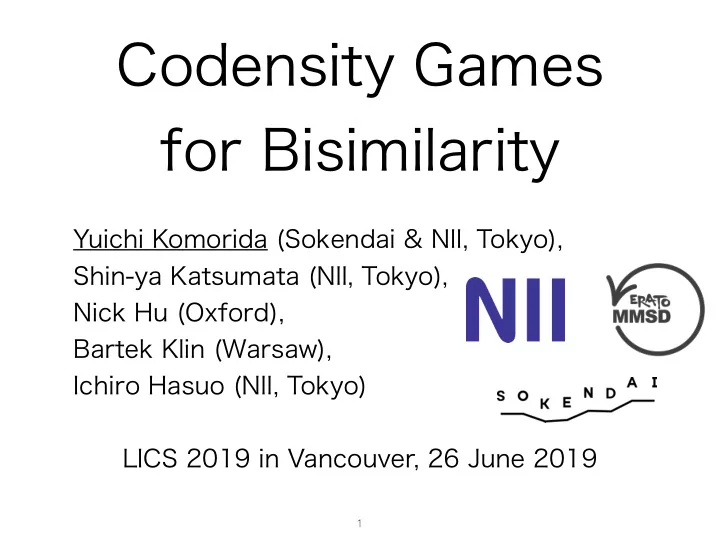

Codensity Games for Bisimilarity Yuichi Komorida (Sokendai & NII, Tokyo), Shin-ya Katsumata (NII, Tokyo), Nick Hu (Oxford), Bartek Klin (Warsaw), Ichiro Hasuo (NII, Tokyo) LICS 2019 in Vancouver, 26 June 2019 � 1
Background Each bisimilarity-like notion for coalgebras separately has 2008] definition by greatest fixed-point game characterization “GFP=game” theorem • Bisimilarity for LTS [Park 1981][Milner 1989] • Bisimilarity for Markov chains [Larsen & Skou 1991][Fijalkow+ ICALP2017] • Bisimulation metric for Markov chains [Desharnais+ 2004][Desharnais+ � 2
Contribution • We give a general template of this picture: • We use • fibrational coinduction [Hermida & Jacobs 1998] • codensity lifting [Katsumata & Sato CALCO15] [Sprunger+ CMCS18] codensity bisimulation codensity game general “GFP=game” theorem � 3
Background Each bisimilarity-like notion for coalgebras separately has definition by greatest fixed-point game characterization “GFP=game” theorem I’ll explain these � 4
weighted) automata, and many others Coalgebra How states behave C : category F : C → C An F -coalgebra is a pair ( X ∈ C , t : X → FX ) We’ll mainly consider C = Set . • P -coalgebras = Kripke frames • D -coalgebras = Markov chains • LTS, (non-deterministic/deterministic/ � 5
Bisimilarity-like notions • Bisimilarity relation Equivalence rel. representing which states behave the same • Bisimulation metric [Desharnais+,TCS318(3),2004] Pseudometric refining bisimilarity, used mainly for probabilistic systems � 6
GFP definition: example use “observations” to distinguish states Let t: X → D X Define Φ : 2 X × X → 2 X × X (predicate transformer) by ( x , y ) ∈ Φ ( R ) Y ⊆ X ⇔ For any R -closed Y ⊆ X , t ( x )( Y ) = t ( y )( Y ) Bisimilarity relation is νΦ . � 7
Game characterization 2 players 😈 💀 ; 😈 wins any infinite play 😈 : I think ( x , y ) ∈ νΦ . 💀 : Is it true? If Y is νΦ -closed, then • From ( x , y ) ∈ X × X ( x , y ) ∉ νΦ . 💀 chooses Y ⊆ X s.t. t ( x )( Y ) ≠ t ( y )( Y ) • From Y ⊆ X 😈 chooses ( x ′ , y ′ ) s.t. x ′ ∈ Y and y ′ ∉ Y 😈 : Don’t worry. If ( x ′ , y ′ ) ∈ νΦ , then Y is not νΦ -closed. � 8
GFP=game theorem: example Theorem [Fijalkow+ ICALP2017] GFP definition game characterization ( x , y ) ∈ νΦ if and only if 😈 has a winning strategy starting from ( x , y ) ∈ X × X. � 9
Contribution • We give a general template of this picture: • We use • fibrational coinduction [Hermida & Jacobs 1998] • codensity lifting [Katsumata & Sato CALCO15] [Sprunger+ CMCS18] codensity bisimulation codensity game general “GFP=game” theorem � 10
Recommend
More recommend